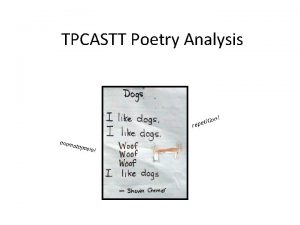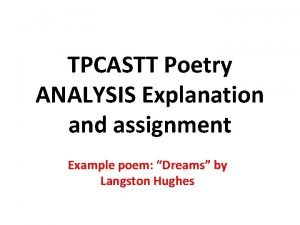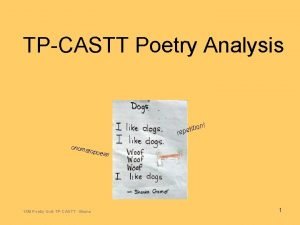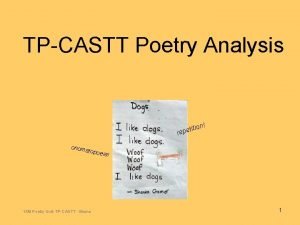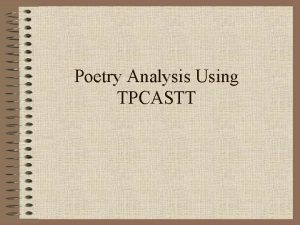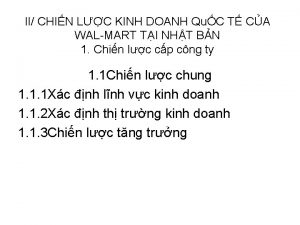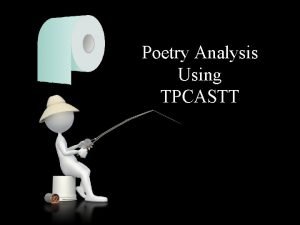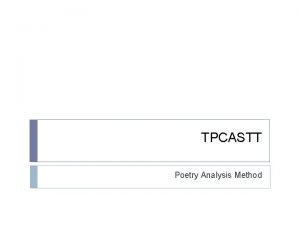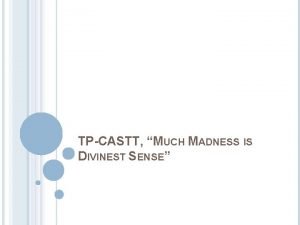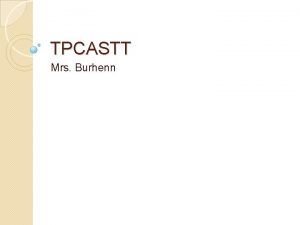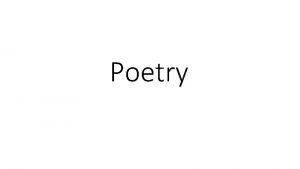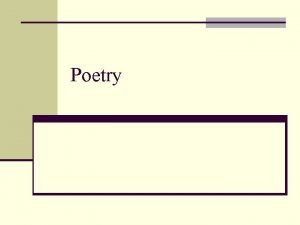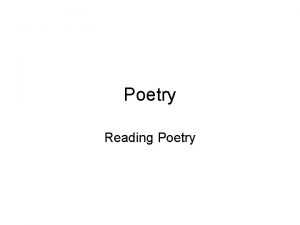TPCASTT A type of poetry analysis that makes
















- Slides: 16

TPCASTT A type of poetry analysis that makes understanding poetry easy…okay, easier.

Using FIVE of the words you can see behind this text box, create an original poem of any type. You must have TWO stanzas.

• Look at the title before you even read the poem • Often, cryptic in nature • Gives you a sense of what to expect (foreshadowing) What would these titles mean to you? “A Little Learning” “O Captain! My Captain!” “The Tide Rises, the Tide Falls”

• Literal meaning of the poem • Difficult to understand the figurative elements if you don’t know the literal meaning Remember that a paraphrase is close to the original length but in your own words.

PRACTICE PARAPHRASING Paraphrase the stanza below O Captain! my Captain! our fearful trip is done, The ship has weather’d every rack, the prize we sought is won The port is near, the bells I hear, the people all exulting, While follow eyes the steady keel, the vessel grim and daring; But O heart! O the bleeding drops of red, Where on the deck my Captain lies, Fallen cold and dead. A great battle was fought and the speaker’s side, victorious. However, in the excitement of battle and returning home, the speaker turns to see his mighty captain, whom he respects, has

• The implied meaning • How the poet conveys the meaning through… • Literary devices, poetic devices, sound devices are all analyzed here to determine meaning • Diction (word choice), sentence structure, imagery, & symbolism are also critiqued. The LONGEST and MOST DETAILED section of TPCASTT

PRACTICE CONNOTATION Underline any figurative elements, words, or phrases that provoke an image. O Captain! my Captain! our fearful trip is done, The ship has weather’d every rack, the prize we sought is won The port is near, the bells I hear, the people all exulting, While follow eyes the steady keel, the vessel grim and daring; But O heart! O the bleeding drops of red, Where on the deck my Captain lies, Fallen cold and dead.

Consonance in the repetition of “r” in line 2. The rough sound of the “r” simulates the hardships the crew endured. Repetition in the sounds of the men calling to captain, he is the most valuable member Consonance in the repetition of the “d” in the last three lines. The “d” is a hard consonant with a final sound much like the captain’s death is final.

• What is the TONE of the poem? • Start with…Is it POSITIVE or NEGATIVE • Then become more precise with your tone sheet

PRACTICE ATTITUDE What tone(s) is in the stanza below? O Captain! my Captain! our fearful trip is done, The ship has weather’d every rack, the prize we sought is won The port is near, the bells I hear, the people all exulting, While follow eyes the steady keel, the vessel grim and daring; But O heart! O the bleeding drops of red, Where on the deck my Captain lies, Fallen cold and dead.

• There is a shift in almost every poem • Can be in…tone, subject matter, meaning, rhyme scheme—anything! • Find it and then ask WHY the shift is in that particular place.

PRACTICE FINDING THE SHIFT Draw a line between the lines where you think a shift occurs. O Captain! my Captain! our fearful trip is done, The ship has weather’d every rack, the prize we sought is won The port is near, the bells I hear, the people all exulting, While follow eyes the steady keel, the vessel grim and daring; But O heart! O the bleeding drops of red, Where on the deck my Captain lies, Fallen cold and dead.

• Take another look at the title • What does it mean after your analysis?

PRACTICE TITLE ANALYSIS How does the title mean now? O Captain! my Captain! our fearful trip is done, The ship has weather’d every rack, the prize we sought is won The port is near, the bells I hear, the people all exulting, While follow eyes the steady keel, the vessel grim and daring; But O heart! O the bleeding drops of red, Where on the deck my Captain lies, Fallen cold and dead.

• Write a theme statement (sentence) • What statement about life is the poet making? • Do not confuse theme with the subject matter of the poem

PRACTICE A THEME STATMENT Create a theme statement for the stanza…what is being said about life? O Captain! my Captain! our fearful trip is done, The ship has weather’d every rack, the prize we sought is won The port is near, the bells I hear, the people all exulting, While follow eyes the steady keel, the vessel grim and daring; But O heart! O the bleeding drops of red, Where on the deck my Captain lies, Fallen cold and dead.
 Block nhĩ thất độ 2 mobitz 1
Block nhĩ thất độ 2 mobitz 1 Tpcastt definition
Tpcastt definition Tpcastt stands for
Tpcastt stands for Shifts in poems
Shifts in poems Tpcastt poetry analysis
Tpcastt poetry analysis Tpcastt analysis
Tpcastt analysis Tpcastt poetry analysis
Tpcastt poetry analysis Paraphrase tpcastt
Paraphrase tpcastt Poetry makes nothing happen poem
Poetry makes nothing happen poem Phân độ lown
Phân độ lown Thơ thất ngôn tứ tuyệt đường luật
Thơ thất ngôn tứ tuyệt đường luật Thơ thất ngôn tứ tuyệt đường luật
Thơ thất ngôn tứ tuyệt đường luật Walmart thất bại ở nhật
Walmart thất bại ở nhật Tìm vết của mặt phẳng
Tìm vết của mặt phẳng Hãy nói thật ít để làm được nhiều
Hãy nói thật ít để làm được nhiều Tôn thất thuyết là ai
Tôn thất thuyết là ai Gây tê cơ vuông thắt lưng
Gây tê cơ vuông thắt lưng

